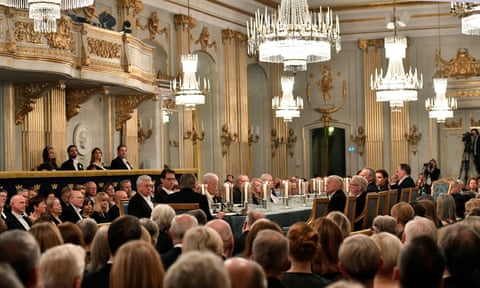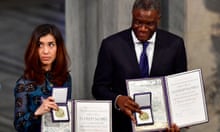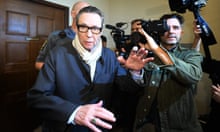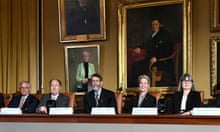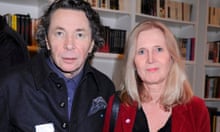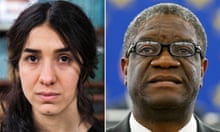In the eyes of its members, there is no more important cultural institution in the world than the Swedish Academy. The members, who call themselves The Eighteen (always in capitals), are elected for life by their peers, and meet for a ritual dinner every Thursday evening at a restaurant they own in the heart of the old town in Stockholm. And once a year, at a ceremony brilliant with jewels and formality, the permanent secretary of the academy hands out the Nobel prize in literature and all the world applauds.
But this year there will be no prize and no ceremony. In November 2017, it was revealed in the Swedish press that the husband of one of the academy members had been accused of serial sexual abuse, in assaults alleged to have taken place over more than 20 years. Jean-Claude Arnault, a French photographer and cultural entrepreneur, is married to the poet and academician Katarina Frostenson. In addition to assault accusations against him, the pair are accused of misusing academy funding. Arnault has denied all accusations, and Frostenson has refused to comment.
The academy is paralysed by the scandal, which was followed by a slew of resignations and expulsions. Six of The Eighteen have withdrawn from any part in its deliberations; another two were compelled to do so. The statutes say that 12 members must be present to elect any new ones, so with only 10, no important decisions can be taken and no new members elected. The vacuum has been filled with invective.
According to one senior academy member, the man responsible for the moral decay of the institution – through his “rotten macho values and arrogant high-handedness” – is the critic and historian Horace Engdahl, a former secretary of the academy. Engdahl, a close friend of Arnault, has in turn called the current secretary the worst the academy has ever had.
The scandal broke when the Stockholm daily paper Dagens Nyheter published the testimonies of 18 women who said that they had been assaulted or exploited by Arnault. Even if many were anonymous, the cumulative effect was impossible to ignore. In two cases the allegations amounted to rape.
What made the matter a wider global scandal is that it seemed to reveal something rotten at the heart of the Swedish Academy: many of the attacks were said to have taken place in luxurious apartments owned by the academy, in Stockholm and in Paris. Arnault and Frostenson also profited for years from academy subsidies to an arts club they owned and ran together. In addition, Frostenson has been accused of leaking the names of literature prize winners to Arnault, with the result that large bets were placed with bookies in Paris. Arnault’s lawyer, Björn Hurtig, told Expressen that his client was “disturbed and resigned … He says this is totally wrong and he is innocent of the allegations.”
Soon after the scandal broke, the secretary of the academy, Sara Danius, announced that she had herself been sexually harassed by Arnault. She called in lawyers and attempted to expel Frostenson from the academy. Arnault, meanwhile, has powerful defenders. His great friend Engdahl campaigned to have Danius expelled in turn. In an article for the national tabloid Expressen, Engdahl deprecated the vulgarity of his opponents in the academy, and called them “a clique of bad losers … who plotted to wound and humiliate Katarina Frostenson”.
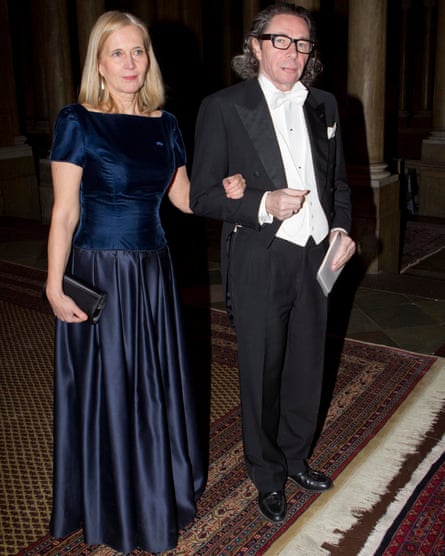
In the event, both women stepped down. Enough members resigned in support of Danius that the academy was left inquorate, with Engdahl in control of the rump. It seems possible that the king of Sweden, who has ultimate responsibility for the academy, will simply close the whole thing down this summer, with potentially disastrous consequences for the Nobel prize in literature. The Nobel Foundation, which funds the prize, is refusing to keep doing so until the academy is cleaned up.
The scandal has elements of a tragedy, in which people who set out to serve literature and culture discovered they were only pandering to writers and the people who hang around with them. The pursuit of excellence in art was entangled with the pursuit of social prestige. The academy behaved as if the meals in its clubhouse were as much an accomplishment as the work that got people elected there.
The academy had thought it stood for the culture of TS Eliot: somewhat masculine and unashamedly elitist, in which power is channelled in the service of tradition. It turns out to be much more like the culture of an ageing rock star: smug, macho, with its cool self-importance armoured by money and fame. The destruction of the academy’s reputation is not just damaging to an old, odd, Swedish institution, but also to the ideals it upheld, and to the dream of a global high culture that the Nobel prize represents.
The Academy was, from its inception in 1786, an elitist institution. It was to contain the best writers and scholars in Sweden, and to guard and nourish the language. It puts out an official list of all the recognised words in Swedish and is still working, after more than a century, on the definitive dictionary of the language. Members are elected for life, and inducted at a banquet with a fanfare of trumpets. It is rich, with investments worth an estimated £110m. Membership brings considerable financial advantages: there are a great many perks in the way of apartments in the loveliest parts of Stockholm, dinners, and the use of delightful offices. The members’ compensation is not published, but according to an investigation of their tax returns by one Stockholm paper, they receive around £40,000 a year when they are active participants. To be the secretary is a full-time post, and while the salary is unknown, the pension increases by £10,000 for every year served.
It’s harder to discover what the academy’s use to contemporary Sweden is. The kind of literature it exists to nourish is kept alive largely by subsidy. With a few exceptions, its members could not make a living from writing. This is, of course, true of writers everywhere today, but in a world dominated by a few global languages, the chief of them English, a language like Swedish – with only 9 million speakers – can’t sustain many writers economically. The books that sell in Sweden are almost always those that can be profitably translated, which means crime novels, with the occasional quirky literary breakout such as the novel Popular Music from Vittula.
In the 1970s, the idea that the academy was the pinnacle of Swedish culture came under attack, at the same time as the wider belief that European – and particularly Swedish – culture represented the peak of human achievement was looking rather unconvincing. To the academy, this was a slowly growing but existential threat. The extraordinary ambition of the academy’s judges was not just to read foreign literature in the original language but, beyond that, to judge their originality and importance within their own traditions. However, as the world of literature expanded to include Latin America, Africa, India, Japan and China, this aspiration began to look unrealistic.
The academy had been established to embody and to strengthen the claim that Swedish was one of the great languages of European civilisation, as worthy of respect as any other. In 1974 the academy put this belief to the test by choosing two of its own members, the poets Harry Martinson and Eyvind Johnson, for the prize – a choice that was greeted with a storm of derision. (Four years later, Martinson killed himself.) This criticism seems unduly harsh: Martinson is a much better poet than, for example, Bob Dylan, who was awarded the prize in 2016. But the dismissive reaction was a warning of things to come.
At this low ebb in the academy’s prestige, the novelist Kerstin Ekman was elected to the chair vacated by Martinson. She lives in the north of Sweden, and was unimpressed by the academy’s prestige. She arranged not to have to travel to the weekly meals in Stockholm because this would disrupt her work too much. She left in 1989 after a very public row when the academy failed even to discuss a motion in support of Salman Rushdie, after a fatwa was issued against him. Two other members also tried to resign over the Rushdie affair. They, like Ekman, were told that the statutes made no provision for anyone to leave before death. So, like her, they simply cut off all contact with the academy. That scandal made the first real dent in the institution’s mystique. The members could have chosen to try to make a difference in the world. Instead, they turned inwards, cleaving to the belief in their own self-importance and in their perfect right to secrecy.
When I was last in Stockholm, in May, none of the academicians I approached would talk at all, and few people would talk on record. It’s a small city, and the cultural circle within it is smaller still. And no one, I think, wants to be seen washing dirty linen in the foreign press. But I was told again and again that the academy was run by small cliques, and that the story could not be understood outside of the personal relations of the people within it.
Ekman was one of the few Academicians whose novels sold in any quantity in Sweden. The split between popular and elite writing was widening throughout the 1980s and it shows up very clearly in the saga of two writers, only one of whom would become important to the academy. In the late 70s, two fiercely aspiring young writers lived in the small northern city of Umeå, tucked under the Arctic Circle, and both were called Stig Larsson. One had started a literary magazine when he was 17 and still in school. As soon as he could wrangle a state culture subsidy, he moved the operation down to Stockholm where the magazine, called Kris, or “Crisis”, became the centre of a tight group of university-educated critics who were just as ambitious and dissatisfied with the state of Swedish literature as he was. At the age of 24, Larsson published a novel full of meaningless sex and alienation called The Autists – and became a critical sensation.
So great was his success that the other Stig Larsson changed the spelling of his name to Stieg. He was working for years in almost complete obscurity on a novel called Men Who Hate Women, while earning his living on small left-wing magazines. He died without ever seeing his books published, but in English translation Men Who Hate Women became The Girl With the Dragon Tattoo – the biggest Swedish cultural export since Abba, or possibly Minecraft. I don’t suppose many members of the academy have read it.
Kris was a small but very fashionable magazine, a war cry against the earnest worthiness of much of Swedish literature then, which was full of noble proletarians and earnest worries about socialism. Kris preached Derrida, and the importance of French and German literature over supposedly provincial American writers. Stig Larsson got to interview Foucault. This was all happening at a time when Swedish popular culture was rushing in the other direction, ignoring European influences, and indeed languages, and embracing the English language, commercial television, hamburgers, credit cards, celebrity and golf.
The insurgent elitism of Kris magazine made a stark contrast not just with popular culture, but with the stiff, unfashionable elitism of the Swedish Academy in the early 1980s. In a narrow, Swedish context, the Academy was radically opposed to the egalitarian ideals of the Social Democrats who had governed the country for 44 years. At one stage there were fewer Social Democrat members of the academy than Catholics – and Catholics in Sweden were then a tiny minority.
In what must be seen as an effort at renewal, the academy turned to a new generation. The young feminist poet Katarina Frostenson was elected in 1992. She entered the academy – as all members do – with a ceremony at a formal banquet. With her French husband, the cultural entrepreneur Jean-Claude Arnault, she ran Forum, a basement club in Stockholm dedicated to high culture – poetry readings and classical music in an atmosphere charged with high seriousness and erotic intensity.

It was then widely believed that if you wanted to get on in the world of elite culture, you had to be in with the Forum/Kris group. The relationship was particularly incestuous because Forum, like the rest of Swedish high culture, is dependent on subsidy, and some of that came from the academy. (According to an article in Dagens Nyheter, the academy said Frostenson did not declare that she owned half the club it was helping to subsidise.)
After the Rushdie affair and the election of Frostenson, the academy grew closer to the circle around Larsson’s Kris magazine, and in particular to the critic Engdahl. Larsson himself was unelectable, having developed a notorious amphetamine habit; he was living the life of a literary rock star to the full. In a recent memoir he describes, apparently without shame, an episode when he picked up a young girl (an intern at Expressen) who looked “unusually brittle” at a party, took her home while treating her with silent disdain, whipped her with electrical flex and then started anal intercourse, at which point he was astonished to notice that she had started to cry. So he took her to her parents, being as polite as he possibly could, for it had suddenly occurred to him that he might be reported to the police.
Engdahl and the literary critic Anders Olsson had edited Kris magazine with Larsson, but unlike him their bad-boy poses were purely literary. Engdahl, as a young critic with a name to make, had written a review of a rival critic’s first novel so vicious that human shit was left on his doorstep in response, but by the mid-90s he was moving to the heart of the cultural establishment. He was on the board of the Royal Opera and of the Nobel Foundation.
Engdahl was elected to the academy in 1998. His then wife, Ebba Witt-Brattström, told Expressen in May: “When he got the news, he bounced around with shining eyes and glowing cheeks as if he’d had a shot of heroin.” That year Witt-Brattström and Engdahl were photographed smiling, cheek to cheek, as “culture’s royal couple” on the front of an upmarket women’s magazine; Engdahl was outraged that his wife was featured alongside him on the cover. “You’ve fucked me up the arse, you bastards,” he shouted in the magazine’s offices. “I don’t want to be shown up as being intimate with my wife!”
On the printed page, Engdahl is a considerable stylist. A Swedish ambassador to London once sent me an essay he wrote to mark the 200th anniversary of the Russian conquest of Finland, as an example of what the Swedish language could still be used to do. He is also arrogant, pugnacious and capable of orbital flights of pomposity. But he embodies the academy’s sense that it is the curator of an infinitely valuable high culture which the outside world has abandoned.
By the late 1990s, Arnault had a reputation as a womaniser, but this did not seem a very serious crime to literary Stockholm then. Just as with the #MeToo scandal in Hollywood, quite a lot of the recent outrage came from the re-evaluation of behaviour that had always been half-known.
“I had heard those rumours [about Arnault] too, but nothing at all about rape; just that he was touchy-feely and interested in young women,” says Maria Schottenius, who was at the time the culture editor of Expressen, and worked closely with Engdahl. “But I had a hard time taking them seriously,” she said, “mostly because his wife, Katarina, always worked with him at the club.” Later, Arnault’s reputation grew so pungent that before one grand literary banquet in 2006, a special request was made privately by the royal court to Engdahl that the Crown Princess Victoria was never to be left alone in a room with Arnault.
The first time the gossip buzzing around Arnault was treated as a scandal was in 1997. Expressen ran an expose of the treatment of women at Forum. The headline was hard to miss: “Sex terror in the cultural elite”.
The story ran: “A well-known cultural personality has been accused by several interns of sexual harassment … One of the women has … sent a desperate letter to several of the cultural institutions which have supported his work.”
The Academy’s then secretary, Sture Allén (who had been in charge at the time of the Rushdie affair), received a copy of the letter. He confirmed that he had read it, but refused to say anything further. He certainly took no action. Frostenson, who was approached by Expressen (though not named), had no comment either. The paper also revealed that the accounts of the club were in a mess, that it was losing £50,000 a year, and that Allén had signed a loan guarantee for it on behalf of the academy. He stonewalled questions about the money, too.
The Expressen story, and the scandal, faded quietly away, although no further young women were sent on work experience to Forum. Anna-Karin Bylund, the artist who had written the letter on which Expressen based its story, in which she complained that Arnault had assaulted her sexually, was dismissed by Arnault himself as a “cunt artist”.
Gabriella Håkansson, now an established novelist, was just starting out as a writer in the 1990s, and was very aware of Arnault. “He was really notorious among my generation of authors, and even to older ones,” she told me. “I have a friend who is now 62 who had told me of her experience. So I avoided Forum because of its reputation.”
But in 2007 Arnault came up to her at a literary reception. “We had only exchanged a couple of sentences before he shoved his hand right up between my legs. It happened so unbelievably quickly. Then my hand came up and slapped him. I remember the onlookers laughed in a rather shame-faced way, as if to say ‘Look, he’s at it again.’
“His assault had nothing to do with sex. I’m an attractive woman and I have been the victim of clumsy flirtation before, but nothing else like that has ever happened to me. The pussy grab was just about power,” she says.
The novelist Lena Andersson suggested that people had been aware of the behaviour attributed to Arnault, but no one had taken it seriously: “In those pre-MeToo days people generally assumed that adult women could be sexually interested in men, even married men, and it was regarded as Victorian, paternalistic and patriarchal to assume that they needed protection and that they engaged in sexual activities against their will. People knew he was a womaniser and assumed that he and his wife had an agreement on this.”
As the scandal developed through last winter and the spring of this year, Engdahl was increasingly identified as the champion of Arnault and Frostenson within the academy, and was attacked all over the Swedish press. Andersson was one of his few defenders. In a piece for the newspaper Dagens Nyheter, she wrote: “The bloodthirsty persecution of him does not solely arise from our society’s populist contempt for distinction, education and authority: to a considerable extent, it is simply an expression of envy ... I have never forgotten the painful insight in a passage Engdahl once quoted from Theodor Adorno: ‘The sniggering from the other pupils when teacher’s pet gets an answer wrong is the seed of fascism.’”
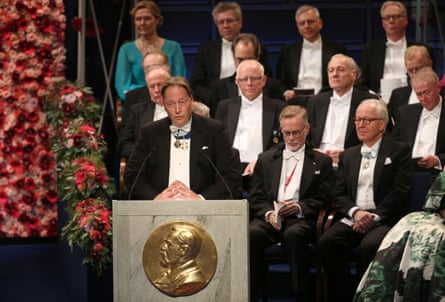
The sense that they were defenders of a cultural hierarchy merged in some members’ minds with the defence of their position in the social hierarchy. It seemed for years that nothing could breach the fortifications of social and sexual privilege protecting the academy and Arnault. There were small scandals around the academy in those years: in 2005 one member stepped down over the award of the prize to an Austrian communist whose work he regarded as pornographic. Bob Dylan was given the prize in 2016, and promptly showed the literary bad boys how a real rock star behaves, treating the academy with sustained contempt for months and piling humiliation on to the ridicule his award had already invited.
The secretary of the academy, who had to put a brave face on Dylan’s behaviour, was Sara Danius, an essayist and literary critic, elected in 2013. “She was always thought gifted and bright [but] she’s not a biddable person,” said Maria Schottenius. “She was overjoyed when she was elected.”
Danius is the daughter of one of the most important, if least conventionally respectable, writers in modern Sweden. Her mother, Anna Wahlgren, published a 500-page child-rearing manual that sold to almost every family in Sweden in the early 1980s (I still have my copy) drawing on her own considerable experience as a mother: she had had nine children by four husbands.
Danius was her eldest child, born from Wahlgren’s first marriage, at 18, to a widower 36 years older than she was. Wahlgren had been a child in flight from an unhappy home; he was a teacher who took her in when she was at boarding school, treated her kindly, and anointed her teenage spots with vintage brandy. She asked him to marry her. He did. The marriage lasted for four years and they had two children. Wahlgren may have been bohemian in her relationships, but she was also strict as a parent.
Danius inherited her mother’s strength of will. When the scandal finally broke over Arnault, she was the academy’s secretary. She was in the hot seat.
The woman who broke the story was Matilda Gustavsson, a reporter on Dagens Nyheter, who had been galvanised by the Harvey Weinstein scandal in Hollywood. How many women in Sweden, she wondered, could say “me too”? It took her weeks of digging to find 18 of them, one for every member of the academy, who would testify, most anonymously, about what they had suffered at the hands of Arnault. But, she says, it grew easier after she had a critical mass: “When you can say to someone that she is the 14th person to appear in the report, they are more willing to talk.” By the end, she says, there were far more than 18 testimonies she could have used.
Details of her report make nauseating reading. There is a pattern of sexual harassment, assault and encounters that turned non-consensual halfway through. Many of the stories centre round the exploitation of emotionally fragile young women by a man much older and more powerful than they were. Although Arnault was not named in the report – in fact, to this day Dagens Nyheter refers to him only as “the cultural celebrity” – no one aware of his position could mistake the target of the story. But the effect was suddenly to turn his behaviour from a matter of private gossip into one of public scandal. Almost all the people who had tolerated what they knew of it up till then revolted. “No one had any idea that it got as close to simple rape as some of the stories told to Matilda,” says Björn Wiman, now the cultural editor of Dagens Nyheter.
Three days after the story broke, the academy met for two and a half hours, and Danius emerged from the meeting to tell the press that it had voted unanimously to suspend all cooperation with Arnault and his enterprises. She added that it had emerged in the course of the meeting that “members of the academy, their daughters, their wives, and employees” had suffered “unwanted intimacies” or “inappropriate treatment” at his hands. She called in lawyers to examine whether the subsidies from the academy to Forum had been legally proper.

Engdahl and the conservative faction on the academy resolved to save Frostenson. They had two things on their side. The first was the unarguable damage that the scandal had done to the academy’s reputation; surely the last thing they wanted was more bad publicity. The second was the sense that the women making allegations were protesting too much, and had already caused too much damage. The backlash was strengthened by the suicide, in March, of Benny Fredriksson, a successful and widely admired theatre director who had been forced out of his position at one of the Stockholm theatres in December after accusations in the tabloid press of high-handedness and bullying. After his death, he was described by his supporters as a martyr to the Swedish jealousy of uncompromising excellence in any field. Besides, Engdahl’s group argued, the Royal Academy of Music had suffered a much worse sexual harassment scandal when 653 women signed a letter in November last year claiming sexual harassment by its members, but no one made a fuss about that: why pick on the academy of literature?
On 5 April this year, the academy met to discuss the report of the lawyers Danius had called in (at the cost to the academy of half a million pounds). According to press reports at the time, the report recommended that the payments to Arnault and his club be reported to the police. Danius argued that Frostenson should be expelled as well. When it came to a vote, a majority, marshalled by Engdahl, rejected both propositions. After the meeting, three more members, among them Engdahl’s old mentor, the literary historian Kjell Espmark, resigned. Danius hung on.
By then the scandal had opened a second front: there had been heavy and well-informed betting in advance of the prize in several of the early years of the century; Frostenson was accused of leaking the names of seven prizewinners to her husband ahead of the announcements. Her defenders argued that there was insufficient evidence to justify such a dreadful punishment as expelling her from the academy. Engdahl argued in a piece for Expressen that it was contrary to natural justice to punish Frostenson for the sins alleged against her husband. But Engdahl could not resist moving on to the attack: Danius, he said, “was the one secretary of all those since 1786 who has worst discharged her duties”.
The convoluted phrasing struck a bum note, but the sentiment behind it was worse. Björn Wiman at Dagens Nyheter says the paper had been worried about whether its own coverage had made too much of the accusations against Arnault, but the readership turned out to be solidly behind the paper’s investigative work. Engdahl’s attack on Danius lost him the sympathy of almost all the female readers. “Women over 55 are the carriers of culture in this country,” Wiman said. “They buy the books, and go to the concerts and the theatre – and they have been outraged by Engdahl.”
Within the academy there was a spine of conservatives who were outraged by Engdahl’s behaviour (Espmark described his former protege Engdahl’s attack on Danius as the most shameful thing he had ever read), but they were not a majority. Four days later, at the next meeting, Danius was sacked as secretary, and announced she was leaving the academy as well. Frostenson was excluded from the academy’s meetings altogether.
The departure of both the women at the centre of the row was presented as a compromise, but immediately denounced as shameful horsetrading. Three more members withdrew in solidarity with Danius. That left Engdahl in apparently full control of the situation, since he had managed to secure the votes of those members who thought that the academy’s survival was more important than its reputation in the outside world.
The Engdahl faction still expected to choose a Nobel prize winner this year, but on 4 May, two days after the rump academy had announced its intention to do so, the Nobel Foundation, which pays out the money, stepped in and announced there would be no award this year. Its chairman has since said that there will be no prize money until the academy has cleared itself.
By this stage, there were only 10 members left in the academy. Twelve votes are needed to elect any new members. The three who had most recently resigned offered to return, and make the body quorate, if Horace Engdahl resigned. He wouldn’t. He still won’t. The stalemate seems absolute. Rumours continue to swirl that the king might dissolve the academy altogether.
On 12 June this year, Arnault was charged with two counts of rape. Whatever the outcome of the trial – the alleged offences took place without witnesses in 2011 – the academy’s prestige has been shattered, probably for ever. At least, that’s how it seems to outsiders.
But when I rang Engdahl’s friend Stig Larsson, the founder of Kris magazine, he had a different take on the whole business: “I have known [Arnault] since 1983. He is a close friend. It is completely impossible that he should have raped anyone. Katarina Frostenson is reckoned, together with me, to be one of the best poets in Sweden … The feminists have driven Sweden to lunacy.”
Main image: the Swedish Academy’s annual meeting in Stockholm in December 2017. Credit: TT News Agency/Reuters
This article was amended on 18 and 26 July 2018 to clarify a quote from Maria Schottenius, and to remove the assertion that Jean-Claude Arnault is much older than Katarina Frostenson.
